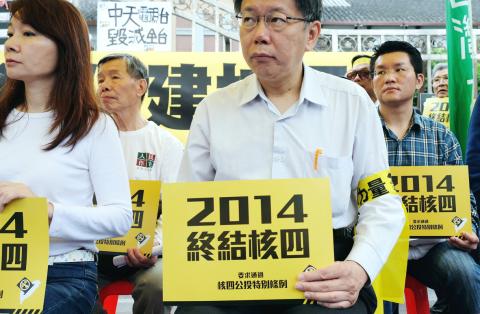Taiwan Power Co (Taipower, 台電) yesterday said the public should consider the possibility of electricity rates being hiked if the Fourth Nuclear Power Plant does not go online.
The comment came in response to former Democratic Progressive Party (DPP) chairman Lin Yi-xiong (林義雄) beginning a hunger strike in Taipei yesterday to protest against the completion of the plant in New Taipei City’s Gongliao District (貢寮) and to encourage the government to recognize that the public is opposed to the plant.
Lin, 72, began his hunger strike at the Gikong Presbyterian Church (義光教會) on Xinyi Road.

Photo: Sam Yeh, AFP
“We respect Mr Lin’s dedication to pushing the government to implement a specific energy policy [to halt construction of the plant], and that is all I can say,” Taipower vice president Roger Lee (李鴻洲) told reporters on the sidelines of a corporate event.
As the supervisor of the plant’s construction, Taipower welcomes the public to express their support or dissent for the Fourth Nuclear Power Plant and nuclear energy, Lee said.
However, one should consider whether there is need to complete construction of the plant from more than one perspective, and people may be required to pay more for non-nuclear plant generated electricity, Lee said.
Taipower plans to finish its security test at the controversial plant by the end of June, as scheduled by the Ministry of Economic Affairs, and will let the government decide whether to install the fuel rods in accordance with its energy policies afterward, he said.
Wu Yu-jen (吳玉珍), a spokesperson for the ministry’s task force on the plant, said Taiwan would face power shortages if the Fourth Nuclear Power Plant does not become operational, since the three operating plants — Jinshan Nuclear Power Plant in Shihmen District (石門) and Guosheng Nuclear Power Plant in Wanli District (萬里) of New Taipei City and Ma-anshan Nuclear Power Plant in Ma-anshan (馬鞍山), Pingtung County — are scheduled to be retired by 2025.
Despite the generation of electricity from alternative energy sources, electricity shortages would remain an issue and would have a considerable impact on households as well as businesses, she said by telephone.
“The shortage issue would only get worse, especially in northern Taiwan,” Wu said.
Taipei uses up to 40 percent of the total electricity generated annually by Taipower nationwide because of its large population.
Taipei residents might face power restrictions sooner than expected, as the Linkou coal-fired power plant in New Taipei City and the Hsieh-ho coal-fired power plant in Keelung are scheduled to be shut down this year.
If the three operating nuclear power plants retired as scheduled in 2025, the country’s total electricity supplies would drop by 40 billion kilowatts a year, if Fourth Nuclear Power Plant was not completed, which would leave up to 90 percent of household demand for electricity unmet, Wu said.

MULTIFACETED: A task force has analyzed possible scenarios and created responses to assist domestic industries in dealing with US tariffs, the economics minister said The Executive Yuan is tomorrow to announce countermeasures to US President Donald Trump’s planned reciprocal tariffs, although the details of the plan would not be made public until Monday next week, Minister of Economic Affairs J.W. Kuo (郭智輝) said yesterday. The Cabinet established an economic and trade task force in November last year to deal with US trade and tariff related issues, Kuo told reporters outside the legislature in Taipei. The task force has been analyzing and evaluating all kinds of scenarios to identify suitable responses and determine how best to assist domestic industries in managing the effects of Trump’s tariffs, he

TIGHT-LIPPED: UMC said it had no merger plans at the moment, after Nikkei Asia reported that the firm and GlobalFoundries were considering restarting merger talks United Microelectronics Corp (UMC, 聯電), the world’s No. 4 contract chipmaker, yesterday launched a new US$5 billion 12-inch chip factory in Singapore as part of its latest effort to diversify its manufacturing footprint amid growing geopolitical risks. The new factory, adjacent to UMC’s existing Singapore fab in the Pasir Res Wafer Fab Park, is scheduled to enter volume production next year, utilizing mature 22-nanometer and 28-nanometer process technologies, UMC said in a statement. The company plans to invest US$5 billion during the first phase of the new fab, which would have an installed capacity of 30,000 12-inch wafers per month, it said. The

Taiwan’s official purchasing managers’ index (PMI) last month rose 0.2 percentage points to 54.2, in a second consecutive month of expansion, thanks to front-loading demand intended to avoid potential US tariff hikes, the Chung-Hua Institution for Economic Research (CIER, 中華經濟研究院) said yesterday. While short-term demand appeared robust, uncertainties rose due to US President Donald Trump’s unpredictable trade policy, CIER president Lien Hsien-ming (連賢明) told a news conference in Taipei. Taiwan’s economy this year would be characterized by high-level fluctuations and the volatility would be wilder than most expect, Lien said Demand for electronics, particularly semiconductors, continues to benefit from US technology giants’ effort

‘SWASTICAR’: Tesla CEO Elon Musk’s close association with Donald Trump has prompted opponents to brand him a ‘Nazi’ and resulted in a dramatic drop in sales Demonstrators descended on Tesla Inc dealerships across the US, and in Europe and Canada on Saturday to protest company chief Elon Musk, who has amassed extraordinary power as a top adviser to US President Donald Trump. Waving signs with messages such as “Musk is stealing our money” and “Reclaim our country,” the protests largely took place peacefully following fiery episodes of vandalism on Tesla vehicles, dealerships and other facilities in recent weeks that US officials have denounced as terrorism. Hundreds rallied on Saturday outside the Tesla dealership in Manhattan. Some blasted Musk, the world’s richest man, while others demanded the shuttering of his